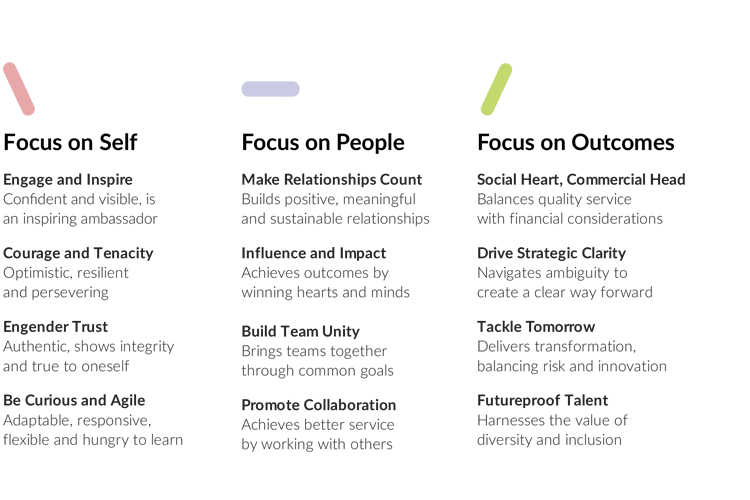Our research has found that the most significant people issue for our clients from the Fire & Rescue services is the development of their senior leaders, highlighted further through the impact of the pandemic on working practices and expectations.
Gartner research confirms this, with ‘current and future leadership bench strength’ as a top 5 people priority in 2021, with 44% of HR representatives reporting that they are struggling to develop their senior leaders.
Challenges for the Fire & Rescue Services
Through our conversations with leaders in the Fire & Rescue Services (FRS) and the recent HMICFRS Annual Assessment of Fire & Rescue Services 2020, a number of challenges have emerged for them. The three that consistently arise are:
- Diversity & Equality
- Economic Constraints
- New Ways of Working.
For each of these challenges, we reference below, the critical leadership behaviours and use benchmarking data from GatenbySanderson’s leadership profiling to provide insights into the capacity of leaders in your sector to deliver on these.
Defining behavioural excellence
GatenbySanderson’s leadership model, Altitude, describes behavioural excellence for leaders working within FRS. The model includes 12 behaviours falling into three clusters; Focus on Self, Focus on People and Focus on Outcomes.
We have mapped assessment data on over 3,500 public sector leaders to these behaviours allowing us to benchmark and compare leader capability in different sectors to the broader Public Sector, as well as narrowing it down further for FRS. We calculate the variance in behaviours to generate a Net Leadership Capability score that can then be reported as a ‘strength’ or a ‘risk’.

While all 12 of these behaviours are key to leadership success, some of these are of particular relevance to the immediate challenges identified for FRS, and insight for these is referenced below.
The leadership behaviours that matter in FRS
Diversity & Equality: The 2020 HMICFRS report indicated that diversity and equality was an area that needed improvement in order for services to be more representative of their communities. In particular, the report noted a lack of gender and race diversity with minority groups still feeling excluded from entering the sector and progressing within it.
The key Altitude behaviour leaders need to address this challenge is ‘Futureproof Talent’ which speaks of leaders being able to harness the value of a diverse workforce and ensure that their organisation has the people and talent it needs, both now and in the future. The Net Leadership Capability score suggests that leaders in FRS show a particular strength in this area compared to leaders across the public sector, thus indicating a leadership ability to set their organisations up for success by ensuring the right people, skills and capabilities are in place to deliver their strategy. FRS leaders should therefore be considering how they can leverage this strength more to drive further improvements across the sector and meet HMICFRS’ recommendation.
However, as FRS leaders look to address diversity and inclusion, and create a service that is more representative of the communities it serves, thought should be given to ensure that diversity is considered in all its forms, including leveraging the lived experiences of individuals and making sure communities voices are heard when shaping strategy and determining priorities.
Economic Constraints: Fire & Rescue Services have long had to work with financial challenges and funding issues, and the HMICFRS report indicates there is also an economic disparity across services. The pandemic and the uncertainty that comes with it is also likely to make these economic restraints even worse. As such, the need for leaders to be able to create organisational resilience, manage competing interests and multiple stakeholders and navigate political agendas has never been more important.
The ‘Outcomes’ behaviours from Altitude of ‘Tackle Tomorrow’ and ‘Social Heart, Commercial Head’ are of particular relevance here. Leaders will need to be able to embrace innovation and drive change, continually transforming the way their organisation operates, thinks and delivers services. Given the financial challenges they face, they also need to be adept at balancing social drivers with commerciality, and put outcomes ahead of outputs and processes. The Net Leadership Capability rating here suggests a potential risk against both of these key behaviours, particularly around getting the balance right between delivering a social imperative with a commercially-oriented perspective.
Without doubt, FRS leaders are driven by their Social Heart which is a strength unto itself. However, with the challenges facing FRS, it will be important for them to better recognise when to prioritise Social Heart over Commercial Head, and vice versa to achieve a greater balance. Understanding where their potential gaps might be in commercial thinking and identifying strategies to close them would also be beneficial.
New Ways of Working: Our discussions with sector leaders have suggested the need for better workforce planning, more effective use of technology and more collaboration across services. Whilst the 2020 report suggests improvements in collaboration, leaders still need to do more on all fronts.
While the behaviour of ‘Curious and Agile’ appears to rate similarly to other public sector leaders and the Net Leadership Capability rating for ‘Promote Collaboration’ suggests that FRS leaders show a strength in this area. There is therefore an opportunity for leaders to utilise this strength to help build a collaboration culture across the sector not just within the Fire & Rescue Service but also with external bodies within the broader system.
Leaders should also be thinking about how they role model these behaviours within their organisation to encourage their staff to operate in the same manner. Embracing a systems thinking approach would also help leaders to leverage this collaborative strength further.
Working in partnership with you
Our Leadership & Talent Consultancy is a team of talent, leadership and organisational development specialists dedicated to helping our clients tackle the leadership challenges that matter to them and ultimately deliver on our mission to ‘find and develop leaders to shape a better society’. Our solutions include succession management, executive coaching, top team development, leadership development programmes, organisational development and board evaluation. Some of our recent work includes:
– First 90 days development coaching for a variety of senior FRS leaders whom our Executive Search practice placed. Providing in-depth feedback on personality questionnaires completed as part of the search process, we identified strengths and potential risk areas, and the impact of their leadership approach on others. Mapping out what individuals wanted to achieve in their first 90 days and how to do it, while creating high impact was also a core component of the discussions.
– Career Strategy Coaching to help senior leaders clarify their aspirations and motivations for their career. One-to-one discussions involved identifying personal drivers and creating a career strategy to help them achieve their long-term goals.
– Top Team Development for a team to help them tackle the ongoing Covid-19 situation but also the rapid/scaled change they were leading. It was important for the top team be able to reflect on lessons learned through Covid-19 and how to apply them going forward, as well as understand how they were building personal and team resilience.
We have extensive experience supporting organisations and individuals to understand their leadership capability and developing their top teams to be future ready. If you’d like to discuss any of the findings in this article or how we can support you and your leadership challenges, please contact Elle Robinson at
elle.robinson@www.gatenbysanderson.com
